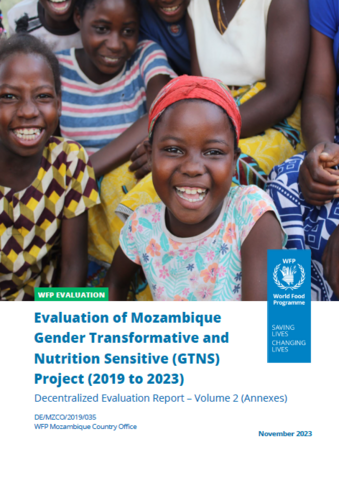
The evaluation was carried out in 2023 and aligned with the WFP's Country Strategic Plan (CSP) across key strategic outcomes (SO) 2 and 3. The GTNS project aspires to scale gender-transformative interventions and enhance livelihoods for the most vulnerable, particularly women.
The evaluation was commissioned for accountability and learning and assessed relevance, effectiveness, efficiency, impact, sustainability, coherence, and connectedness, addressing overarching questions on GTNS's contribution to improved nutritional diversity, reduction of stunting, and empowerment of women and girls. The followings activities were covered by the evaluation: school feeding, nutrition, food assistance for assets, food and nutrition security analysis and diagnostic, and capacity strengthening.
Key evaluation findings included:
- Positive influences on dietary quality, micronutrient adequacy, and food consumption scores in intervention villages, with concerns about the adaptability and sustainability of innovative interventions like hermetic bags and solar dryers.
- Successful engagement, exceeding 90% exposure rates, particularly in asset training and construction, though careful planning is crucial due to the timing's impact on participation levels.
- Hindered integration of gender-transformative approaches by funding and coordination gaps, with persisting challenges in adapting technology, reducing post-harvest losses, and achieving behavioral changes.
- Positive impacts achieved, but improvement in coordination and longer timeframes is needed, along with opportunities for enhancing efficiency in resource allocation, collaboration, and sustainability strategies.
- Significant efforts in improving child nutrition, yet challenges persist in reducing stunting and wasting levels among children under five, and positive strides in women's economic empowerment are noted, with limited impact on women's roles and mobility, necessitating sustained efforts.
Key recommendations from the evaluation included:
- Prioritizing targeted initiatives challenging deeply ingrained cultural norms to dismantle power dynamics and gender inequalities, creating a supportive environment for sustainable change and addressing women's economic constraints.
- Prioritizing climate change as a cross-cutting issue within GTNS and ensure seamless integration into WFP CO climate smart activities.
- Clearly articulating the gender and social norms change process before upscaling the GTNS project to ensure effective implementation.
- Enhancing gender-transformative indicators, bolster monitoring, and strengthen partner capacities in M&E to improve the project's impact assessment.
- A comprehensive and multisectoral approach to address malnutrition, emphasizing gender equality, community involvement, and decentralized leadership.
- Developing a comprehensive indicator reference sheet with project-specific indicators adhering to SMART criteria, ensuring clarity, consistency, and effective measurement methods.
